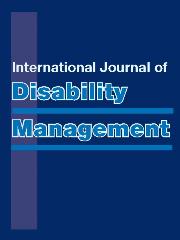Crossref Citations
This article has been cited by the following publications. This list is generated based on data provided by
Crossref.
Lucas, Todd
Weidner, Nathan
and
Janisse, James
2012.
Where does work stress come from? A generalizability analysis of stress in police officers.
Psychology & Health,
Vol. 27,
Issue. 12,
p.
1426.
Gomes, P.
Kaiseler, M.
Lopes, B.
Faria, S.
Queiros, C.
and
Coimbra, M.
2013.
Are standard heart rate variability measures associated with the self-perception of stress of firefighters in action?.
p.
2571.
Koopmans, Erica
Wagner, Shannon L.
Schmidt, Glen
and
Harder, Henry
2017.
Emergency Response Services Suicide: A Crisis in Canada?.
Journal of Loss and Trauma,
Vol. 22,
Issue. 7,
p.
527.
Arble, Eamonn
Daugherty, Ana M.
and
Arnetz, Bengt B.
2018.
Models of first responder coping: Police officers as a unique population.
Stress and Health,
Vol. 34,
Issue. 5,
p.
612.
Rodrigues, Susana
Paiva, Joana S.
Dias, Duarte
and
Cunha, João Paulo S.
2018.
Stress among on-duty firefighters: an ambulatory assessment study.
PeerJ,
Vol. 6,
Issue. ,
p.
e5967.
MacDermid, Joy C.
Nazari, Goris
Rashid, Coomal
Sinden, Kathryn
Carleton, Nicholas
and
Cramm, Heidi
2019.
Two-month point prevalence of exposure to critical incidents in firefighters in a single fire service.
Work,
Vol. 62,
Issue. 3,
p.
477.
Arble, Eamonn
Daugherty, Ana M.
and
Arnetz, Bengt
2019.
Differential Effects of Physiological Arousal Following Acute Stress on Police Officer Performance in a Simulated Critical Incident.
Frontiers in Psychology,
Vol. 10,
Issue. ,
Tyagi, Oshin
and
Mehta, Ranjana K.
2021.
A Methodological Framework to Capture Neuromuscular Fatigue Mechanisms Under Stress.
Frontiers in Neuroergonomics,
Vol. 2,
Issue. ,
Leroux, Janette
Richmond, Rachel
Fitzpatrick, Sara
Kirkland, Hannah
Norris, Deborah
Mahar, Alyson
MacDermid, Joy
Dekel, Rachel
and
Cramm, Heidi
2021.
Experiences of families of public safety personnel: a systematic review protocol of qualitative evidence.
Systematic Reviews,
Vol. 10,
Issue. 1,
Du, Bronson B.
Yung, Marcus
Gruber, Jennifer
and
Yazdani, Amin
2022.
Organizational strategies to address posttraumatic stress injuries among Canadian paramedics.
Work,
Vol. 72,
Issue. 3,
p.
1035.
Brunyé, Tad T.
Giles, Grace E.
Eddy, Marianna D.
and
Navarro, Ester
2022.
Cranial Electrotherapy Stimulation (CES) Does Not Reliably Influence Emotional, Physiological, Biochemical, or Behavioral Responses to Acute Stress.
Journal of Cognitive Enhancement,
Vol. 6,
Issue. 3,
p.
417.
Stegerhoek, Pablo M
van der Zande, Jesse
Bolling, Caroline
IJzerman, Herman
Verhagen, Evert A L M
and
Kuijer, P Paul F M
2023.
Royal Netherlands Marechaussee Personnel’s Self-Perceived Occupational Demand Profiles: A Latent Profile Analysis Shows the “Good” Versus the “Bad”.
Military Medicine,
Vol. 188,
Issue. 11-12,
p.
e3575.
Figueroa, Rodrigo Andrés
Cortés, Paula Francisca
Miller, Carolina
Marín, Humberto
Gillibrand, Rodrigo
Hoeboer, Chris Maria
and
Olff, Miranda
2024.
The effect of a single session of psychological first aid in the emergency department on PTSD and depressive symptoms three months post-intervention: results of a randomised controlled trial.
European Journal of Psychotraumatology,
Vol. 15,
Issue. 1,


